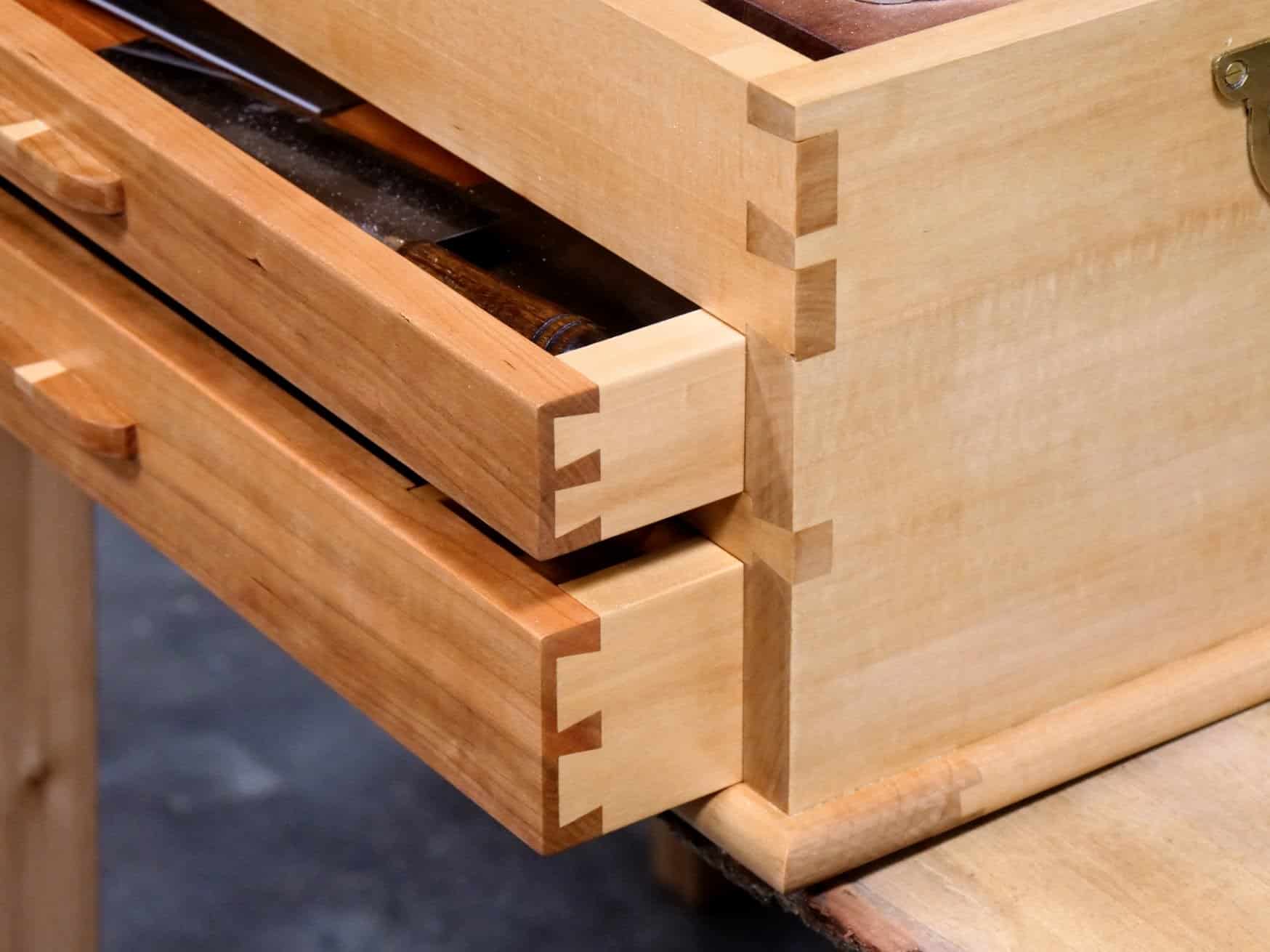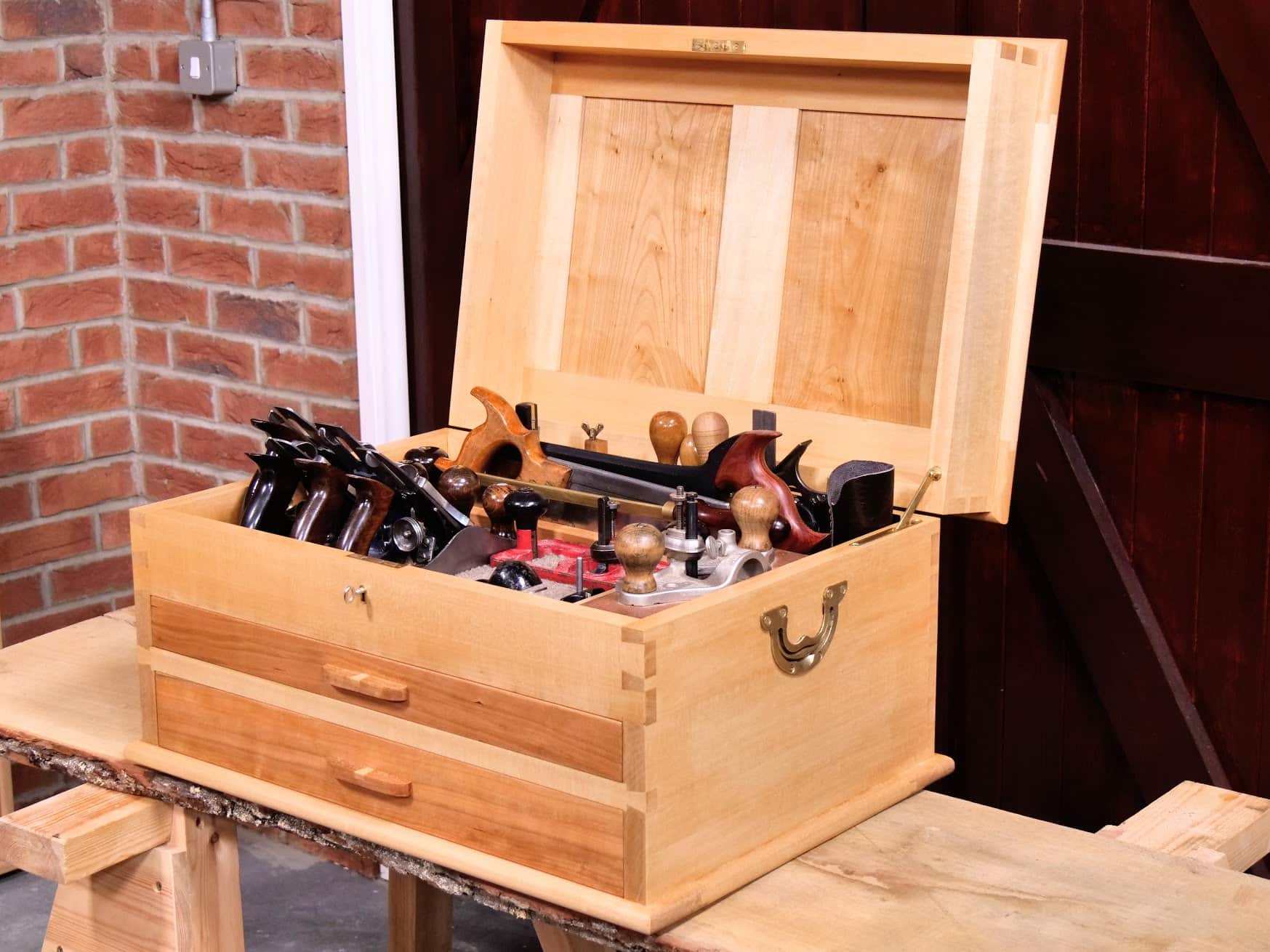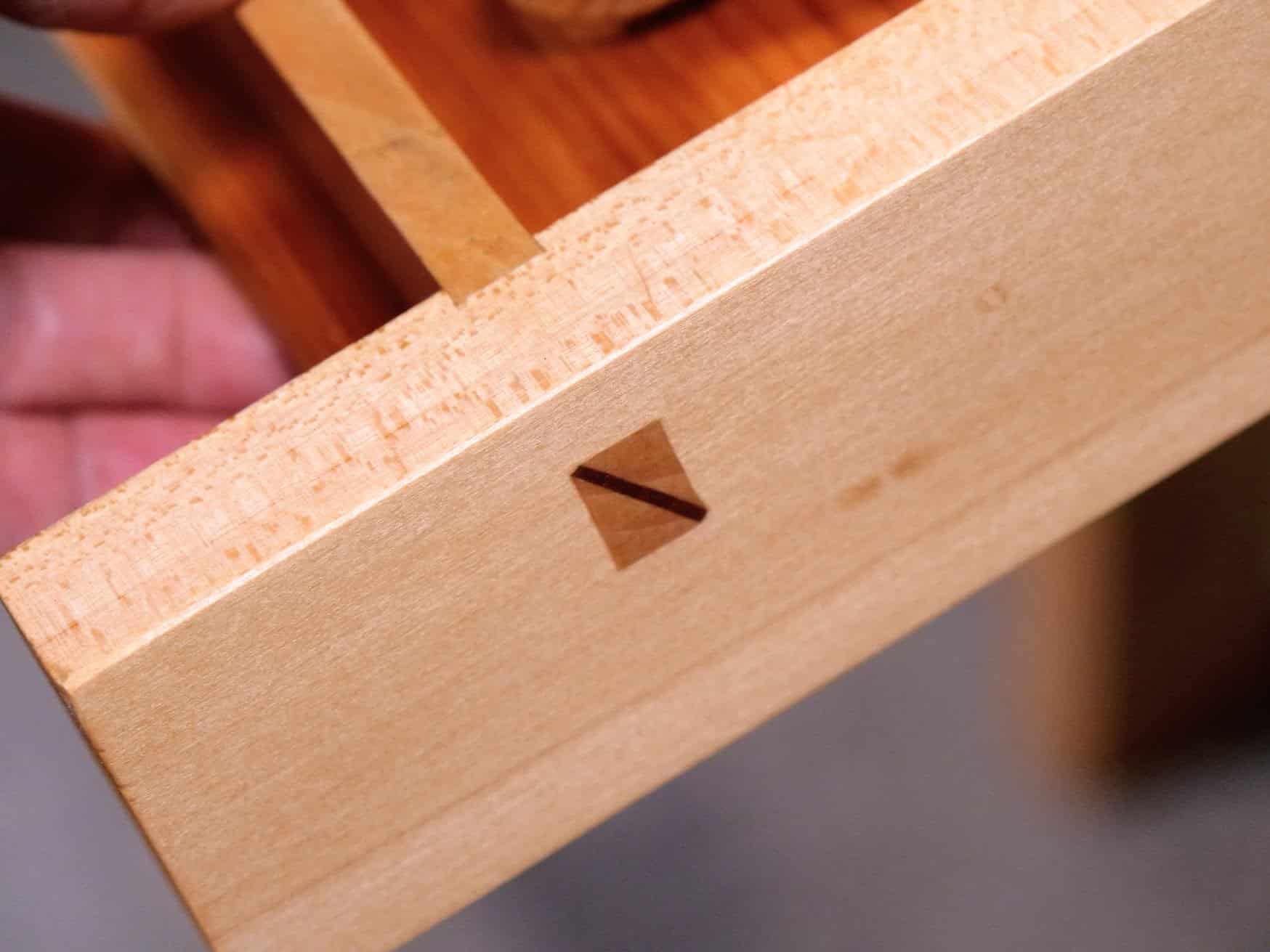You, The Woodworker! Yes You!
All images of the tool chest below are the work of student woodworker Hannah Matthews who has trained with me part time for the past 18 months.
I know this about woodworking, something I’ve had to work with with people I’ve trained on a closer level, one minute you are not a woodworker and the next you are. It’s a strange phenomenon but a woodworker requires no qualification by diploma or degree, NVQ or whatever. It’s industry that needs it, not you. All you need is to be able do is demonstrate that you have the ability and the skills necessary to do woodworking competently and safely. In your own life in your own shop I am sure you will take all the steps necessary to establish good and safe patterns of working. I just love that. Yes, I apprenticed, was indentured, but all that meant was that I did a few years as an apprentice. Had I known then what I know now I would still have become a woodworker and a furniture maker but just by perhaps working alongside another woodworker with skill, not to get certification to qualify me because, well, just the decision to be a woodworker is all the qualification I needed. It’s no different than If I interview for a job waiting on in a cafe and never had experience before. The day I don uniform and apron I become what I was not, a waiter. At 15, when I started to work with wood, I became a woodworker.
Not a good one at all, but, foot on the first rung, raised head looking up, I knew which direction to go. I knew straight off that I was cheap labour and machine fodder for a rich snob that owned the company but knew nothing about my craft. It was my first step as a woodworker moving towards manhood with a penchant for a long term career in wood. Mostly I just liked being a woodworker and it paid enough for me to buy some tools and give some extra to the family income. Two key mentoring craftsmen then steered me in the right direction there was no graduation as such. I have and will always be grateful to them. Whereas I achieved some qualifications in my life, and they might have been interesting from time to time, it was after that that I really began to learn and grow. In the doing of or being a woodworker. A passion for woodworking and additional automatic self study and research put real flesh on the bones.
Here is the outcome of another persons work. She has about 250 hours of mixed work in the making and perfecting of it. Not totally dedicated to the one project, but machineless work in that all elements including most of the rip sawing and planing from rough sawn material was all hand work only. This is Hannah’s recently completed tool box. She hand picked her lime wood by visiting the timber suppliers with me and then added cherry from some of my offcuts. I think it’s very nice. The workmanship extraordinary. I have taught the classes on making this and it is a high intensity high demand course for anyone. In the courses I taught all the wood was milled to size and planed throughout. In hannah’s case she chose the harder route and she did it to gain the whole experience and to prove to herself that she could do it. Practical use of winding sticks and hand ripsaws and so on was something she had yet to master. This project gave her all the experience she needed for her future. It took great courage considering her level of working knowledge. On her first day with me as her teacher I informed her that she had just become something that before she was not, a woodworker. Self-deprecating, she shied away from the title a little, but become a woodworker is what she did. She never turned back. She has now made many things since day one and with this under her belt she is able to make anything she sets her mind on. No multiple year courses, just bench space to work, a little steering (as it was for me) and some self study, experimentation and research. Her knowledge of woodworking, woodworking tools, equipment and so on is now well along to the fullest extent. Like me, she knows she will never know everything, but she also knows that she is a woodworker.
Stepping into woodworking begins with a single decision. It’s simple enough because all you have to do is say it. Yup, I know, it’s just the first step, but when you say it, if only to yourself, you be come a woodworker. To do it though, you have to do it seriously. It’s not certificate dependent except for some industry enterprises. Even there, it is only a question of showing you are competent in certain skills surrounding work and safety. Common sense stuff most people already have. I know a barrister named Matt and a barista too who felt one day that they wanted to become woodworkers and the day they stepped into my class many years ago, I mean that minute at 9am, they became woodworkers, serious woodworkers.I know lots of people like that. Pole lathe turners walked into a wood with a teacher and they became pole lathe turners, another chose a machine-driven lathe and both qualified for the title of woodturner. Whereas turnery is only a small part of general woodworking, turning whether by machine or pole, treadle or whatever is not machining wood. What makes it different? In turnery you manipulate the tools to work the wood. With machine woodworking you have substituted such dextrous skills and art to channel wood inline or to curved guide or jig that then guarantee basic parallel cuts along a given path, plane or line. This makes the huge difference.
So, all in all, thankfully, there is no state requirement or qualification that qualifies you to become a woodworker of any kind, either here in the UK or in the USA, freely you can make whatever you want and freely you can sell whatever you make to anyone who chooses to buy from you and you choose to sell to. This is not the same for all countries, sadly.
I think it is important for people to understand that woodworking does not need qualifiers to become a woodworker or even be good at the craft at all. Those working in the industry will most likely be interested in any gained experience you may have to occupy a job. When you be come a woodworker, whether as someone purely interested in the craft rather than in pursuit of a career or indeed working for yourself you need nothing to qualify you except the outcome of your hands. Your reputation will go before you and word of mouth speaks volumes. Start out by making gifts for family and friends, work colleagues and such. Use this as the learning period until you become ever more confident and competent. In a year or two, repeating practice in the making of things, you will become more competitive and ultimately you will be making items for a wide range of reasons and, who knows, using it at first as a second job, it can become your main job if that is indeed what you want.
Don’t sell yourself short or sell yourself to some entity. At the end of the day, most good woodworkers I know only had a desire to become. Make, make more, make and give, make and sell, take the first step with a few hand tools. Make a simple but very decent workbench and join a sales promoter-outlet like Etsy to kickstart your energies. You are already a woodworker when YOU decide you have the freedom to be one.


I believe woodworking may be the solution to world peace.
VERY NICE WORK, Hannah!! It would be a treat to see you step in front of the camera and shoot a few Masterclasses for us! Give Paul a run for his money…
That’s some very fine work! Hanna should be very proud to have achieved that level of excellence. The joinery is very clean and crisp and I love the lid stay she’s used.
The tool chest is quite a project. I know this because I finally finished mine yesterday 🙂
Excuse me. I meant Hannah
HELL yeah
(I apologize for the long reply – somehow my replies here end up very long – feel free to shorten or delete it if it bothers you, no offence will be taken)
That toolchest is a work of sheer beauty. ‘Art’, with a capital A. ‘Skillful’ is the word that comes to mind. Looking at it I can see only one *very tiny* imperfection: in the top picture, top drawer, bottom corner of the top dovetail, an ever so small splinter of wood appears. Very, very impressive. I’m sure the maker sees much more little imperfections – I know I do with the things I’ve made myself; things which other people don’t notice. Must be nice to make something so lovely which you know will outlive you.
And as a good student is also a reflection upon the teacher….
But reading your blog and the replies of other readers, I think I’m slightly different from the rest: I am not nor do I intend to become a woodworker. What I seek are some basic skills in woodworking and tool use/maintenance. Making proper joints (using dovetails instead of ‘screw and glue’), sawing straight, planing, chiseling, etc.
A few years ago I noticed more and more that I lacked skills in a certain area: woodworking (and bricklaying – which is something I want to learn too). There are several fields I’m pretty good in, if I say so myself. But I noticed that whenever a project required (or would benefit from) wood and working it, I found myself seriously lacking. Came upon your youtube channel by accident, first via the scissor-sharpening video, and a year later (as I had bought a secondhand #4) via your plane-fettling video. A few months later I again ended up on your youtube channel by accident and this time watched a few other videos. The knifewall impressed me the most at the time and was the single thing that dramatically improved the quality of my work. And that’s how my woodworking-ball got rolling about two years ago.
I think I’m now at the level where you were on your second or third day of your first week at your apprenticeship. The first part of the learningcurve is steep – progress happens very quickly. I’m still at that stage. Which is nice, as one sees continuous big improvements in oneself. Sawing straight and square is now something that is more common – as opposed to the exception, as it was in the past. Sharpening is no longer the big hurdle it was in the past (though it’s still very far from a routine thing).
I even notice every now and then that I need to do something (chisel work, or some planing), and that, while in the past it used to be a thing of concern/worry when I had to do something like that, I now simply do it without too much thought. “will just plane a bit off” or “will just chisel that bit out”. I call that progress. Sometimes even am a little smug about it, “I’ll just quickly X/Y/Z it and it’ll be fine” – and usually the work will *be* fine.
I don’t want to (or have to) become a woodworker – but I do want skill in using woodworking tools and sharpening them/keeping them up, so that I’m at least not totally incompetent whenever something has to be done to/with wood.
Now if only there was a Paul Sellers-equivalent of bricklaying too….
I find it amazing that you already are a woodworker and yet deny yourself its existence, proportion and percentage in your life. When I married I became a husband. I was unqualified by experience yet a husband I became the day I made my vows. When our first child came along I became a father. No experience in fatherhood either. I volunteered into both and the very act of a made up mind totally qualified me for both positions. Why is it not the same for other things. Yes, I know, if I need a new heart I want a surgeon with experience. but it is not the paper certificate hanging on the wall in a black frame I truly need, it’s the gowned person behind the mask holding the scalpel that I look to for experience in the field with boots on the ground as it were.
Did Hannah’s flawed work under the microscope at that juncture so draw attention as to the disqualify her? Not at all. She was qualified from the first minute by her stick-with-it-ness and she is far better qualified now. Had she given up at the first fence she would have stopped being and becoming. Indeed she did not. She was, is and is becoming a woodworker. So it is for everyone.
Flaws are a beautiful thing; we all have them and yet we find a way to work and live together. Flaws don’t deter me and I’ll see your “constructive criticism” and raise you 2 flaws.
I think the minute flaws that appear in hand made objects adds to the beauty, you know that someone has toiled to make it, it is not machine perfect but it is beautiful.
Actually, experience tells me that what people often perceive as a slither is damage caused after or during the making. The fact is her work is some of the best I have ever seen for someone so new to the craft. Perhaps even the best. It is not full time that she is with me, just a few hours per week. She has definitely raised the bar for both amateur and professional makers in my view.
Jesus was a carpenter
Maybe anyone can become a woodwork, but certainly not everyone can become a craftsman. I believe completing an apprenticeship with a competent, knowledgeable and talented craftsman is much better than teaching yourselves. What one can learn in a school in a single week would take a year at home on your own. Throughout the 18th century the guild would not allow an incompetent person to practice any craft without having completed an apprenticeship. In their final year of completing their apprenticeship they would build something and present it to the guild for inspection. If approved only then were they allowed to call themselves “journeyman.”
Would you allow a backyard mechanic with one week or even one year’s experience replace the brakes in your car? He can call himself a mechanic, but truth be told he isn’t. Only after years of service within the industry and only after completing a written and practical exam and having passed both can he or she obtain a certification by the board with title of a “mechanic”.
I think that you may have missed some of the point here, Salko. Personally I believe it IS the sheer act of the very first step that begins the journey and the qualification begins with the mental assent, the first step and the union between the person and the craft they choose to master. I believe everyone can become any kind of craftsman or woman they want to be if they have the single ingredient of a made up mind. In an ideal world, working alongside a mentoring craftsperson would be great, but in a world where such skills are greatly diminished (and in some cases completely gone) and very unlikely to return, we must reevaluate systems that failed and look elsewhere, which includes the guilds of old of course, virtually non existent now, and the education systems and the governance of such things. Had everyone followed your suggestion, hundreds of thousands of highly skilled crafting artisan woodworkers, mostly amateur craftsmen and women and perhaps, sadly, less so year on year, so-called professionals, we would never have filled the gaps left by the so-called professionals and educators. Now, I do believe that many educators at boots-on-the-ground level strive to maintain standards, but often their hands are tied by administrators and politicians.
Looking on my own past, my experience tells me that in a year I learned all that I needed to know about the beginnings of my craft. After that it was up to me and my output/input that helped me to grow. I saw men stay at a level I could never have stayed at but my bosses, the company owners, fell abysmally short in their mentoring capabilities. I believe a very different future emerging from the old systems. Some bad, some very bad and then some very good. Long term the best will last. Perhaps cultural shifts have established something different and something better. Who knows what craft training will look like down the road aways.
Oh, and I called a backyard mechanic two years ago who had no fixed place of work about my clutch and he came in a small van, replaced the clutch and the belt and the break pads in four hours. I was very happy to have him do the work and support him. But I am less risk averse than most.
Salko,
Uh oh, I replaced the brakes on my vehicle with zero official training. And I never took any exam. Yet everything works safely and beautifully. Plenty of people that go through training are still horrible at what they are certified for. There are both really good doctors, for example, and also really dangerously bad doctors. All of which went through rigerous training. A piece of paper is irrelevant to the competency and your protectionist attitude places barriers to entery, raises prices, and stifles creativity and innovation, and reduces the overall productivity of society. As far as woodworking goes a portfolio of past work would be a far greater resume and reassurance that they are actually competent.
Salko, what you said also goes against basic human freedom and dignity. Everyone should be able to make deals and trade that is willing. All that is needed is a willing buyer and seller. It is not the business of anyone else. To interfere with people voluntarily cooperating and exchanging anything is immoral.
That said, I am not against guilds, training, or more formal education. I think all of that is good and valid. I take offense at the statement that the guilds would not allow people to practice a craft without first getting their permission. I realize that there are still a great many professions that require licenses and other professional accreditations and they are all immoral and hurt productivity in each and every field they exist in. Licensing is not immoral though, just stopping unlicensed people from also competing in the industry is immoral. A license could be a great selling point that gives you the leg up. But to use licensing requirements as monopoly rights to an industry is horrible for the world. Is the AMA really the best group to decide the qualifications of doctors in America? In my mind, plumbers did far more to improve health and lifespan in the 20th century than doctors. Doctors, licensed doctors, were still doing aweful things to people while plumbers were quietly increasing health and vastly improving quality of life.
Both of you have made many valid points, but certain trades e.g. a mechanic cannot run a business without being a qualified mechanic. He/she can be superb at their job, but no one other than the said knows this. If this person wants to run a mechanical workshop as a business then that person must have or get a certification in the said field. To get it the said person must demonstrate his/her skills in front of a competent board of qualified mechanics to attain a certification before they can operate a mechanics workshop business. This is about safety and there’s nothing immoral about that.
About everyone working an industry willy nilly is a false economy. We have seen since Uber has come in through the backdoor how they have affected the taxi industry worldwide. While it may not concern many of you about that and may be in support of that for various reasons, the horrendous licencing fees that were in place were there for a reason. Since governments are truly corrupt around the world they have allowed Uber to practice as a taxi company without calling themselves a taxi group (loop hole) and as such has flooded the market. This oversupply of competition on the roads has led to a severe income drop and to some suicides. This has now opened the door to Ola and Lift which will further compromise the livelihood of all concerned. Whilst the consumer is more than happy to pay a pittance to have themselves carted around would not get out of bed to work for the income these drivers are now working for. Eventually and I surmise in a few short years probably five, driverless cars will replace these drivers. Sadly this disease will spread to truck drivers, courier drivers, bus drivers etc. 100 million jobs worldwide will be stripped according to the economists.
People may speak against the guild of the 18th century as much as they want, but many of their strict rules were there for benefit of the trades and also the consumers. If you wish to read about the guild, I have written several articles on it on my blog. https://journeymansjournal.wordpress.com
Sorry about the incorrect link https://journeymansjournel.wordpress.com
I’m involved in folk music, in the sociological sense — music made to share with others in our community, just because it gives us joy to do so. We apply much the same principle: if you can speak you can sing, and if you can sing you’re a singer. If you can speak lyrics you can write then, and if you write a song you’re a songwriter. Maybe not a very good one yet, maybe not a great one ever — but everyone can get better with practice, at their own pace and in their own time, and we’ll try hard to listen for what you are trying to do and encourage you to continue trying.
The single greatest advantage kids have is that they aren’t afraid to try something, see if it works, and if not they learn from the experience and try again or try another way. I’m still trying to re-learn that attitude.
I’ve sometimes thought that more people might try crafts if an earlier emphasis was put on “this matters, that doesn’t, and here’s how you can recover if it bothers you” … an equivalent of the musical advice that if you don’t call attention to your mistakes most will forgive you and many will not even notice.
Thanks Paul. You really are an inspiration to all of us who have other careers but have a passion for woodworking.
WONDERFUL … ?
Beautiful work! It’s wonderful to see what dedicated (and gifted) people can achieve with the right level of support. I wish Hannah continued success along the path she has embarked on.
While I’ve had the chance to study under great teachers, in great institutions, I have come to realise that this is not the only way to achieve one’s potential, and that it’s not suited for everyone. I do wish that people who want to pursue other paths, such as real apprenticeship, would be more supported and recognised, regardless of the degree they may have (or not).
Thank you for inspiring many people, myself included, with your words and coaching.
It is the person who learns. And it is the person’s will to learn that govern’s all. When the person decides to be a woodworker, he or she is, which is exactly Paul’s point. Becoming an expert at what one wants to be is always a journey, but thinking of oneself as a woodworker (or pianist, or symphony conductor, or barista, or taxi driver) starts the moment the will decides.
Gaining the label of “journeyman,” or “craftsman” is mostly irrelevant, and any type of “certification” is needed only by those who cannot accurately judge the level of their own work … or by useless management that can’t tell the difference either.
CONGRATULATIONS Hannah on being a woodworker, obvious from the willful decision you made long ago. The tool chest shown here does indeed show extraordinary workmanship. Very nicely done!
Hannah, your tool box is an excellent example of your devotion to your craft. You are a tribute to yourself and your master. I’m sure there were some mistakes along the way but mistakes are the steps we use to climb higher in our lives. Never fear the, learn from them! You have a gift; to see, to listen, to learn, to do. Keep pushing forward, Hannah, you are doing great things!
I think that Hannah will have a bright future as a craftswoman, it is very inspiring to see such quality work so early on!
Hanna: your tool chest is a work of art, very well done ,you should be proud. I have not yet transformed my work to hand tools only, I am finding this to be a challenge, I was brought up using power with hand tools. Am finding it hard to change, am not sure if it’s the patience I am lacking. As you know the power equipment is much faster, but I love the hand tool mindset. Am thinking of trying to take a course with Paul in the future. I am retired now so it is now possible to consider. Anyway, great work Hanna……g.
Inspirational, wonderful toolbox indeed! I especially like the choice of woods! Hats off to you both! I also truly like the hardware, which I still struggle to find in such quality.. Would you mind telling which hardware was used please?
The hinges are standard drawn brass, the stay is from Brusso and the handles are very nice antiques ones she found on eBay.
Hannah Matthews has made a beautiful contribution to us all, showing what can be achieved with perseverance. She has a wonderful life ahead because of it. Wonderful!
It seems to me that Paul is absolutely right. If I pick up a tool and put it to the wood, I believe that I am by definition working wood and so I am a wood worker. Am I a good wood worker? Maybe not. But then again, like almost everything else, what is termed “good” may be all relative. I have watched more than I can count of Paul’s videos. My work bench is still a work in progress, mostly because it got side tracked on a cradle for my first grandson that my kids really wanted me to make. So the bench got put on hold, at least it was to the point where it was usable. I made my first real project, the baby cradle. I used hand planes. I used chisels and hand routers — the hand routers I also made — to make mortise and tenons. I used a spoke shave to round the edges. I put raised panels in the ends, a technique I got from Paul’s clock video. It turned out great. I surprised both myself and my kids. They are planning on passing it on from child to child and grand child to grand child as the family grows.
My kids think it’s perfect, but when I look at it I see things I could have done better. I have yet to do a single dovetail. That is my next skill to try and master. When I see Hannah’s work I am in awe. I can only hope that one day I will be able to do as well. Now, does Hannah believe it’s perfect? I suspect maybe not. I suspect that when Paul looks at his work he also sees things he could have done better. At least I hope so. I see being a “good” wood worker as a journey and not a destination. I sincerely hope that will each skill I master I will see the next thing that needs to be mastered. And at each step along the way, I will treasure being the wood worker that I am.
I’m in much the same position. I got my bench to the point where it could be used to make a crib for our first child. One day I’ll finish the bench – in the meantime though, we have a crib that will hopefully be handed down several generations despite its imperfections.
Hannah, beautiful, inspiring work.
Hannah is a woodworker! No doubt about it. But can she lift that box full of tools? Ha!
Not sure why this was said really, I don’t care for sexism, Phil. She does as much and the same lifting as I do.
Beautifull work, miss Hannah.
Thank you for your positive thoughts, mr. Paul Sellers.
Wonderful work Hannah! Greetings!
I had the privilege of meeting Hannah and seeing her tool-chest at the open day in June and was more impressed than I have been by anyone or anything for a very long time. Hannah impressed me because of her quiet enthusiasm and her tool chest impressed me because it is indeed a work of art. It is extremely well-made and functional, the drawers fit and slide better than any wooden drawers I can remember, the joints are so smooth I could not feel them. The combination of timbers used, the brass furniture, and the delicately dovetailed drawer handles makes it a truly stunning and individual piece of workmanship. I found it had a remarkable tactile attraction and, like a piece of sculpture, I just wanted to keep touching it!
The tool chest is inspirational as is the fact Hannah went from zero experience to producing it in 18 months of part time apprenticeship. Hanna and her tool chest are very relevant to the point Mr Sellers is making. I’ve made a couple of items in my life of which I have been quite proud but the tool chest is a standard to aspire to and work towards. The inevitable mistakes in my progress will be part of the learning curve (i.e. make the mistake and then learn not make it again). Maybe (one day) I will produce items of comparable standard and maybe I won’t but having a picture of that wonderful workmanship in my mind gives me the target to aim for. Whether I achieve that target (or how close I can get to it) is entirely down to me and the credit (or blame!) will be mine alone.
Hannah and her toolbox are yet another testament to Mr Sellers’ ability to pass his skills on to anyone who wants to acquire them.
Early on in my career I pursued Industrial Technology and landed a decent job out of University. After 7 years of computers and desk work I was ready for a change and chose to pursue my passion of woodworking building custom furniture and in doing so also acquired my journeyman ticket in cabinetmaking. At the time it was one of the best decisions I made. After many years of doing what I enjoyed most, that is building fine furniture, I needed to get out the environment of power tools (including hand sanders or dust machines as I like to call them) primarily due to the dust and their long term health effects it was having on me. This, despite diligent wearing of dust masks.
Power tools have their place for speed and volume but from my personal experience my health took priority over my woodworking. I‘ve always preferred hand and hand tool woodworking making shavings and chips instead of the saw ‘dust’.
Hand saw sharpening and many of the fine layout techniques as shown in Pauls’ videos were not areas covered when I pursued my journeyman cabinetmaking back in the mid ninties and I do doubt they are skills taught today, apart from the specialized classes focusing on hand tools.
Since applying the saw sharpening and layout techniques through Pauls’ teachings I now spend more time evenings and weekends as time allows doing what I enjoy doing most.
Now in my 50’s I am back to computer and drafting work and have come to be satisfied for what it is. If I were to win the lottery tomorrow, yes, I would certainly be back to building hand crafted furniture full time but in the meantime the family still needs to be fed and the mortgage still needs to be paid. I’ve found it does come down to balance and what we are willing to compromise.
If you’re not content with your daily work look for other opportunities within or elsewhere and if you’re not finding the opportunity you’re looking for perhaps you can create it. I once heard it said ‘It is a wise man that knows when to be satisfied’. Not to say one should just accept whatever comes along but enjoy the journey for where you are now and take advantage of opportunities as they come along.
Many thanks to Paul and team for making the videos and techniques public knowledge for all to enjoy and pursue! Also, great job Hannah on a fine tool cabinet I’m sure you will cherish for a lifetime of woodworking!
Beautiful work, very envious of this tool chest. I don’t suppose there’s a plan available anywhere for this? Mainly interested in knowing how you went about putting a floor in to support the planes and saws above the first drawer.
You’ve already taught me how to dovetail for which i’m very thankful, and I’m looking to start the workbench sometime but currently all my tools are wrapped in their ‘original’ packaging and carried around in a canvas bag so this would certainly be a big help to have before I start the bench.
when you start there ask you 15 years of experience and when you are 50 there hoop you only have 2 years. But when you are free.You do wat you wants and most of them are jealous and wants you to be part of them organisation
I understand why the weight of the toolbox might be a problem. I did not realise it was for holding solid stuff like planes. When I was doing electrical work I had one of those metal folding toolboxes . One morning I bent down to pick it up one handed and ended up with a slipped disc. I was out of action for a fortnight. So just don`t park it on the floor unless you lift it straight with both hands . Beautiful work though .